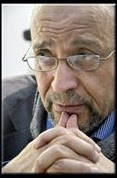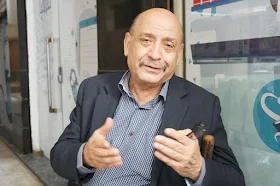The Dialogue of the Pine Trees, poem by El Sayed Hafez.
Translated from Arabic by Dr. Salwa Gouda.
Thank you, Dr. Salwa Gouda, for translating my short story alongside this distinguished group of writers — fifty years after it was written. It is truly an honor that such remarkable individuals are reading and translating it.
The Dialogue of the Pine Trees
1
-Dawn did not caress my nose
-And I waited until morning
-Those who rose at dawn
-Carrying smiles on their faces
-Scoffing at hardships
-Shackled by the governor’s chains of fear
-No one called me in the morning
-And the security office did not call
-Try to buy me a pink dress to adorn myself with
-I will try, my friend
2
Panorama
Because God does not wish for human hunger, and because you, sweet-talker, sleep in my bed holding my hand, kissing it, caressing my nose… For two years we have not met, nor shaken hands, and the forest is covered in ice… She was like an old child… And you stood at the door of the cold room, your eyes kissing the Eastern sun, Africa’s joy… And we were under the pine tree, tickling the journey of life for our village, defeated in the battle for bread and the secret police files. We wore the stubbornness of the impossible, our hands entwined in defiance, and we crossed the forbidden bridge to the old Sheikh’s house to eat eggs and cheese, listening from his old arghul to the melodies dreaming of the future.
3
-I bought the newspapers
-Couldn’t grasp the secret of politics
-And I walked for three hours
-I understand
-I read
-I try
-I try… I try… I try
4
Curtain
In the narrow alley, your father, the tailor, was making a suit for the Chief of Police, his hands trembling. He turned to me and asked about you, saying: “Make him flee the country. Safety is gone inside… And where to flee? How? The city has washed its filthy feet in the river of pollution…” And though he sprays the Chief of Police with perfume, the coming order… “Search for everyone whose face bears a question mark.” Your father washed his face twenty times but couldn’t erase the question mark from his face. And you, my son, here on the shore, throwing stones into the sea’s belly. How many stones has the sea eaten? How many ships have sunk in it? How many, how many… And all people fear it. Try to flee… On a cloud… On a horse… On a boat… On a magazine… On a tree… Try to flee on a beast… Try to get outside the borders and cover your face with your old grandfather’s cloak… And she, leave her, she won’t forget you, though she might forget you and marry another and forget your love and bear an obedient, docile child like the others. And you, try to work in trade, and forget about throwing stones in the sea, about reciting poetry, friends’ talk, and the dialogue about what is and what ought to be. The universe is the universe… But your mind doesn’t believe this.
5
-Do we consult the duck’s eggs?
-What is the end of your white and red dreams?
-What is the end of life, struggle, and debate?
-The duck hatched seven ducklings
The red dream makes bread for the lean years, and the white dream makes a million Sinbads across all lands under the banner of day.
-The end of life is Paradise and Hell… and the end of struggle is evolution, and the end of debate is the inevitability of evolution.
-You sophist!
-Corrupt intellectual.
-Shh.
-Say “Shut up” instead of “Shh,” you fool.
-Things make things.
6
The Act
In the market, the lost son walked searching for his mother… He cried… The vegetable seller began scrutinizing the faces of women walking over the corpses of foolish men.
And the man calls out: “Who lost a son?”… The carts jam, the market fills, the child cries, the noon sun scorches the vegetable seller, women haggle over prices, the child cries. A woman stood before him screaming: “My purse was stolen!” and the child calls “Mother!” And you, here inside the market without ID, what’s your name? What city are you from? Why did you come? Your dirty skin, your hair matted with grey dust… The godless heat challenges your faith in endurance, and the voice of an old sheikh cries: “Cow for sale!” From the old man’s hand, a knife emerges. The whole market pulls out knives… They slaughter the cow; women rush for the meat to buy it. And you, who will buy you? Who will sell you? If only they would stab you with their knife… If only they would kill you. If only they knew. And the child searches for his mother… No one knows anyone.
7
-Do you know Dostoevsky?
-Prices are terrifyingly high.
-Do you know the secret of European music?
-My sock is torn, and the city’s belly is empty.
-Oh, ignorant one, dialogue with you is pitiable.
-Do you know what the rent is now?
8
About the history teacher… about the first inspector… about the head of department… about the Director of Education… about all the headmasters… about the Undersecretary of Headmasters… about the Minister… about the Prime Minister… Khedive Abbas once said: “An ignorant nation is easier to lead than an educated one.”
And the village visited by the blind Sheikh of the Kuttab (Quranic school) who taught… Planted… Reaped… Ate. He didn’t teach us who sowed, who reaped, who ate… And sleep, oh “Arouset El-Moulid” (festival doll), in my lap.
“Yasmine,” my niece, and my son who returned from the Moulid (saint’s festival) sad… because the boat sank at Sidi Ibrahim El-Desouki… And I, who still haven’t understood who sows, who reaps, who eats – though the whole village understands the meaning of these words to this day… From my mother… from our neighbor… from my brother’s wife… from my sister… from our neighbors… from all the women. There is no onion left in the market, no sleep left, nothing left but stewed fava beans… I climbed onto the roof and threw a stone at the dog.
The dog never forgot this… He always lay in wait for us… until he found me alone in the field. He started barking, I started throwing stones at him. I found the dog had a thousand heads… All the heads stretched out around me… They were barking… I fell into the water drain while running, my clothes got dirty, and that day my uncle, Hajj Atiyya, gave me a hot beating… Oh, memories of fleeting days… How did I live in exile when you, my homeland, were my deep wound? And you, oh hour, carrying my memory to me… I woke up to a man’s hand… “Where to?”… “You can’t pass this way.” I walked the other way, the dog’s bark sounding from afar.
© El Sayed Hafez
El Sayed Hafez is an Egyptian writer born in Alexandria in 1948. After graduating in Philosophy and Sociology in 1976, he had an extensive career in journalism and cultural institutions, primarily in Kuwait (e.g., Al-Seyassah newspaper, National Council for Culture) and later the UAE and Egypt, holding various editorial and managerial roles (e.g., Al-Shasha, Al-Mughamer magazines, Arab Homeland Center). He was a pioneer as the first Arab writer published in English by the UK (7 plays) and Arizona University (5 plays in English, 3 in Arabic), including online publications. His prolific output includes numerous novels (e.g., Nescafe, Plain Coffee), plays for adults and children, TV/radio series, and critical studies. He received awards for playwriting, including for children’s theatre.
Translated by Dr. Salwa Gouda, who is an accomplished Egyptian literary translator, critic, and academic affiliated with the English Language and Literature Department at Ain Shams University. Holding a PhD in English literature and criticism, Dr. Gouda pursued her education at both Ain Shams University and California State University, San Bernardino. She has authored several academic works, including Lectures in English Poetry and Introduction to Modern Literary Criticism, among others. Dr. Gouda also played a significant role in translating The Arab Encyclopedia for Pioneers, a comprehensive project featuring poets, philosophers, historians, and literary figures, conducted under the auspices of UNESCO. Recently, her poetry translations have been featured in a poetry anthology published by Alien Buddha Press in Arizona, USA. Her work has also appeared in numerous international literary magazines, further solidifying her contributions to the field of literary translation and criticism.
................








 4:03 م
4:03 م
 sayedhafez
sayedhafez








